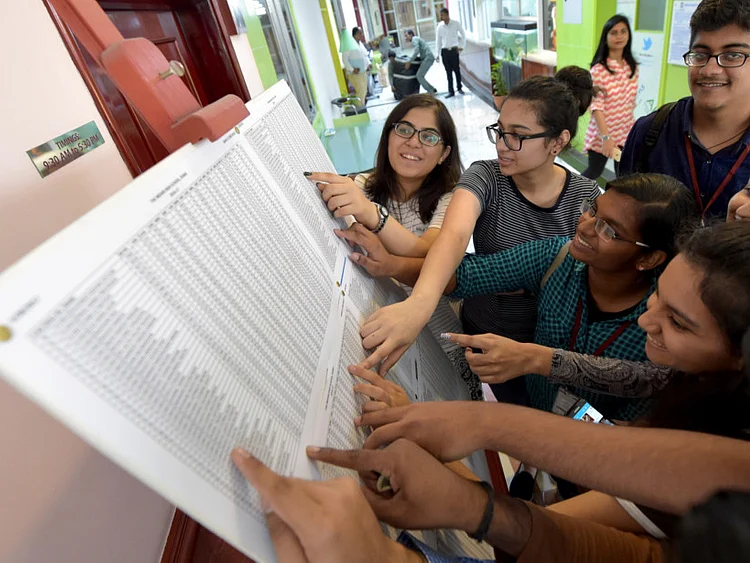CBSE announces new rule: Schools ask Indian expat students in UAE for Aadhaar
CBSE clarifies if students here need Aadhaar card and must create mandatory APAAR ID

Dubai: A new rule issued by the Central Board of Secondary Education (CBSE) in India has raised concerns among Indian expat students and parents in the UAE, as some schools here have sought the Aadhaar card numbers of students to create a new mandatory ID.
CBSE earlier this month made it mandatory for students to submit their APAAR IDs while registering for the Grade 10 and 12 board exams, according to Indian media reports.
What is APAAR ID?
APAAR stands for Automated Permanent Academic Account Registry. The APAAR ID is an identification number which is linked to student enrolment and enables tracking a student’s journey from pre-primary to higher education, as envisioned under India’s New Education Policy (NEP) 2020.
The Ministry of Education in India has now mandated the adoption of APAAR IDs for all school students as part of the Digital Public Infrastructure for Education, according to Indian media reports.
Though the unique ID, also touted as a solution to fake education certificates, was proposed for all students, currently CBSE has made it mandatory only for students appearing for board exams starting from 2026.
Earlier, the board had required schools to send a list of candidates who would appear for the Class 10 and 12 board exams, alongside the registration details of students when they are in Classes 9 and 11.
Now, registration for the board exams requires an APAAR ID as well.
Why is Aadhaar needed?
Though Aadhaar is still voluntary, it is required for accessing certain government benefits and subsidies, as well as for linking with PAN cards and for some banking services.
Now, for creating the APAAR ID, students must provide details such as name, age, date of birth, gender, photograph, and Aadhaar number.
While reports from India indicate that the requirement of linking Aadhaar with APAAR ID has sparked a debate around data security and privacy, it has taken a different turn in the UAE.
The reason: Most of the Indian expat students do not have an Aadhaar card, as it is not mandatory for Non-Resident Indians (NRIs) to have one. Also, foreign students studying in CBSE schools in the UAE cannot get Aadhaar IDs, as they are issued only to Indian citizens.
Since the 12-digit unique identity number can be obtained based on biometrics and demographic data, Indian expats are required to visit any Aadhaar enrolment centre in India to register.
What is happening here?
Some schools in the UAE have abruptly asked students appearing for board exams next year to provide Aadhaar numbers for creating their APAAR IDs, causing panic among several students and parents.
“Our school has just informed us about the need for Aadhaar in order to complete CBSE registration and create APAAR IDs for Grade 10 and Grade 12 students,” a concerned parent in Dubai wrote to Gulf News.
“This requirement involves biometric verification in India. Unfortunately, the school did not communicate this to parents before the summer vacation. Like many others, we spent weeks in India during that time, and we could have easily completed the Aadhaar process then. Now, families like mine are left in a very difficult situation. It is not feasible to travel back to India just for this. I am certain that many other parents are facing the same challenge,” he explained.
For such important requirements, he pointed out that timely communication from schools is essential. “It would save parents unnecessary stress and ensure smooth compliance with CBSE guidelines. This is unacceptable,” he added.
However, some schools like International Indian School in Abu Dhabi have prepared their students well in advance with the required documentation.
“CBSE had communicated this requirement to us well in advance, long before the summer vacation. Multiple circulars were issued and some interactive sessions were held. Hence, we had asked the students to get their Aadhaar cards during summer vacation and we are well-prepared for the board exam registration,” Dr Beno Kurien, principal of the school, told Gulf News.
Meanwhile, some schools like Gulf Asian English School in Sharjah are awaiting further instructions from the CBSE. They have been left on the fence, since most of their students do not have Aadhaar, and they also have international students of different nationalities.
Dr Nasreen Banu, principal, said: “We are yet to discuss this issue with our regional director. We have students of 11 foreign nationalities. It is not practically feasible for all our students to get Aadhaar cards. CBSE has been listening to the concerns of foreign schools and respecting our demands. I am sure they will allow us to provide students’ passport numbers and additional supporting documents like Emirates ID.”
What does CBSE say?
When Gulf News reached out to Dr Ram Shankar, Director of the CBSE Regional Office and Centre of Excellence in Dubai, he clarified that CBSE would “maintain the status quo” in the case of foreign schools.
That means, he explained, CBSE schools outside India are not required to take any action regarding APAAR ID as of now. “CBSE will very soon issue the necessary instructions and advisory, and whatever support is required. Accordingly, further course of action can be taken in due course of time,” he added.
Sign up for the Daily Briefing
Get the latest news and updates straight to your inbox
Network Links
GN StoreDownload our app
© Al Nisr Publishing LLC 2026. All rights reserved.